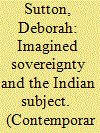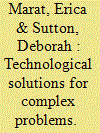|
|
|
Sort Order |
|
|
|
Items / Page
|
|
|
|
|
|
|
| Srl | Item |
| 1 |
ID:
121948


|
|
|
|
|
| Publication |
2013.
|
| Summary/Abstract |
In 1904, the British Indian government passed the Ancient Monuments Protection Act and, in doing so, radically enlarged the state's bureaucratic claim to structures defined, for the purposes of the Act, as monuments. The project of conserving the Hindu temple was beset by disagreements. The claims of the colonial state and local Hindu devotees were separated by different precepts about religiosity and alternate orders of aesthetics, time, and history. However, it is clear that there were also confluences: legislative authority could masquerade as custody of the antiquarian and, in practice, the secular veneration of material antiquity blurred with Hindu divinity. This paper combines an exploration of the principles of archaeological conservation, as they were formed in the European bourgeois imagination, and then traces their transfer, though imperial administration, to case-studies of specific temples. Of particular interest is the deployment of the Act by local administrations and the counter-challenges, appropriations, and manipulations of the same legislation. How were the aesthetic codes of conservation-and the legislation that sought to order and enforce their introduction-compromised by religious claims and practices?
|
|
|
|
|
|
|
|
|
|
|
|
|
|
|
|
| 2 |
ID:
108917


|
|
|
|
|
| Publication |
2011.
|
| Summary/Abstract |
This article considers the jurisdiction assumed by the Indian state over populations of Indian origin in British territories after 1947. In an intense and often excessive treatment of the Indian subject as citizen, appropriate conduct was promoted, approved political organisations were patronised and behaviour regarded as delinquent was castigated. Using examples from Mauritius, East Africa, the West Indies and South-East Asia, this article examines this short-lived project as a means of interrogating the post-colonial Indian state and more general questions of post-colonial identity, jurisdiction and sovereignty. The terms of the directives sent by the Ministry of External Affairs were derived from domestic agendas and anxieties. A singular Indian identity, free from regional linguistic or religious difference, was promoted. Inevitably, however, this Indian identity was articulated negatively, through the identification of those considered to be communal, separatist and therefore ''non-Indian'. However, local populations in these territories were by no means passive recipients of the diplomats' attention. In attempting to direct political action, the emissaries of the Indian state found themselves drawn into local political cultures over which they could not hope to exercise control.
|
|
|
|
|
|
|
|
|
|
|
|
|
|
|
|
| 3 |
ID:
177907


|
|
|
|
|
| Summary/Abstract |
This essay examines ‘smart city’ initiatives rapidly emerging across Eurasia that are aimed at the surveillance of disorderly and criminal behaviour in public spaces. They are a result of both locally driven demand to modernise law enforcement and global pressures to innovate. We specifically compare Kyiv, Almaty, and Bishkek. Each city differs in regard to who initiated smart city policies and under what conditions new technology was purchased from foreign vendors. Our essay contributes to the growing socio-legal literature on Eurasia by analysing how these electronic surveillance projects are used to manufacture an orderly, safe society and achieve modernity without the burden of deeper political change.
|
|
|
|
|
|
|
|
|
|
|
|
|
|
|
|
|
|
|
|
|